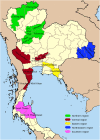Enhanced surveillance for severe pneumonia, Thailand 2010-2015
- PMID: 32326941
- PMCID: PMC6696659
- DOI: 10.1186/s12889-019-6774-5
Enhanced surveillance for severe pneumonia, Thailand 2010-2015
Abstract
Background: The etiology of severe pneumonia is frequently not identified by routine disease surveillance in Thailand. Since 2010, the Thailand Ministry of Public Health (MOPH) and US CDC have conducted surveillance to detect known and new etiologies of severe pneumonia.
Methods: Surveillance for severe community-acquired pneumonia was initiated in December 2010 among 30 hospitals in 17 provinces covering all regions of Thailand. Interlinked clinical, laboratory, pathological and epidemiological components of the network were created with specialized guidelines for each to aid case investigation and notification. Severe pneumonia was defined as chest-radiograph confirmed pneumonia of unknown etiology in a patient hospitalized ≤48 h and requiring intubation with ventilator support or who died within 48 h after hospitalization; patients with underlying chronic pulmonary or neurological disease were excluded. Respiratory and pathological specimens were tested by reverse transcription polymerase chain reaction for nine viruses, including Middle East Respiratory Syndrome Coronavirus (MERS-CoV), and 14 bacteria. Cases were reported via a secure web-based system.
Results: Of specimens from 972 cases available for testing during December 2010 through December 2015, 589 (60.6%) had a potential etiology identified; 399 (67.8%) were from children aged < 5 years. At least one viral agent was detected in 394 (40.5%) cases, with the most common of single vial pathogen detected being respiratory syncytial virus (RSV) (110/589, 18.7%) especially in children under 5 years. Bacterial pathogens were detected in 341 cases of which 67 cases had apparent mixed infections. The system added MERS-CoV testing in September 2012 as part of Thailand's outbreak preparedness; no cases were identified from the 767 samples tested.
Conclusions: Enhanced surveillance improved the understanding of the etiology of severe pneumonia cases and improved the MOPH's preparedness and response capacity for emerging respiratory pathogens in Thailand thereby enhanced global health security. Guidelines for investigation of severe pneumonia from this project were incorporated into surveillance and research activities within Thailand and shared for adaption by other countries.
Keywords: CAP; Community-acquired pneumonia; Global health security; Severe pneumonia; Surveillance.
Conflict of interest statement
The authors declare that they have no competing interests.
Figures
References
MeSH terms
LinkOut - more resources
Full Text Sources
Medical
Miscellaneous



